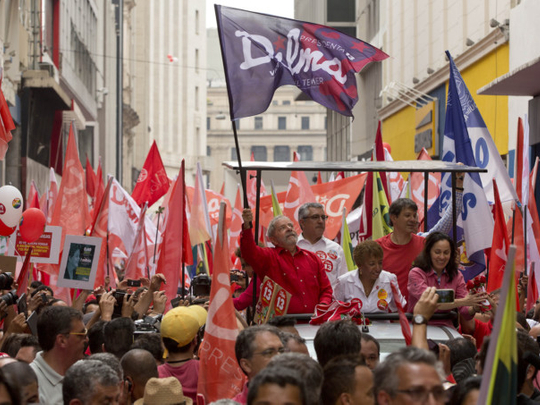
So you are the leader of a large emerging country and up for re-election. It has been a bruising year, the economy stinks, the scandal-ridden state oil company has just been downgraded by Moody’s Investors Services and this annoying challenger comes from behind to steal your lead on the eve of the runoff vote. Worse, every time you claw your way back up in the polls, the stock market tanks. What is an incumbent to do?
Go negative, of course. Olivia Pope was not available, but lucky for Brazilian President Dilma Rousseff, no one can wag the dog like native campaign guru Joao Santana and communications maestro Franklin Martins. The result is one of the bitterest races on record — where slights trump platforms — that has Rousseff on top again for today’s vote and Brazilians more divided than they have been in 25 years.
Santana and Franklin earned their retainers in the first round by taking down Marina Silva, the charismatic vice-presidential contender who stepped up when Socialist Party hopeful Eduardo Campos died in a plane crash. In round two, the PT (Workers’ Party) attack dogs are going after Neves, recasting the successful former governor with a centrist platform as a “daddy’s boy” and a shill for fat cats and gringo carpetbaggers.
Much of this is nonsense. Neves’ Social Democracy Party stopped hyperinflation, steadied the economy and used the windfall from privatisation to launch cash transfer programmes that became the foundation for marquee poverty fighting programmes in Brazil and beyond. Neves himself was a competent governor and in eight years fixed the flailing economy of Minas Gerais, Brazil’s second most populous state, a record Rousseff herself once praised, but no longer.
Credit Rousseff’s touts for airbrushing Neves’ vaunted “management shock” into capitalism gone wild, and calling the PT militancia to arms. “It’s about us against them,” said Rousseff’s mentor, former president Luiz Inacio Lula da Silva, in a rant against media critics last week. He went on to compare Neves to a Nazi and Herod, all in the same speech. Neves struck back, likening Rousseff’s spin doctors to Goebbels.
Brasilia is no city of angels, but the campaign bullying has chafed on voter sensibilities and drawn a stand-down order by the head of the Electoral Court. Late last Wednesday, both campaigns agreed to stop insulting one another, but Brazilians are not holding their breath. Worse, the melee has drowned out any coherent discussion of how the rival candidates mean to restore investor confidence, clean up Petrobras, pay for better social safety nets, fix what may be the most vexing tax code in the hemisphere and get the 28 parties in Congress to endorse a political reform that may doom many of them to extinction.
Economy is in a mess
That points to the larger riddle of campaign 2014. The same land where millions marched last year to protest shoddy public services and crooked politicians — and 72 per cent said they were dissatisfied with the state of their country — also looks poised to return the sitting government to power. Flyby analysts say it is because Brazilians are too battered by corruption to notice, or too ethically compromised themselves to care. Government backers counter that Brazilians are better off than ever and merely want to safeguard their gains against austerity disguised as reform.
Failing health care, rising corruption, spiking crime and creeping inflation are indeed the top four concerns of the rising middle class, according to an Instituto Data Popular poll last week.
“If none of this mattered, Dilma would already be reelected,” said Brazilian anthropologist, Roberto DaMatta. Yet, while the Brazilian economy is in a mess, it is not yet a shambles. Only when “personal misfortune converges with awareness” of wider disgraces like corruption are voters compelled to rebel, write political scientists Carlos Pereira and Marcus Andr Melo.
That the Brazilian street is quiet does not mean that voters are cowed or inherently bent — just that they are making calculated guesses. We will know for sure today.
— Washington Post
Mac Margolis is Brazil bureau chief for Vocativ.










